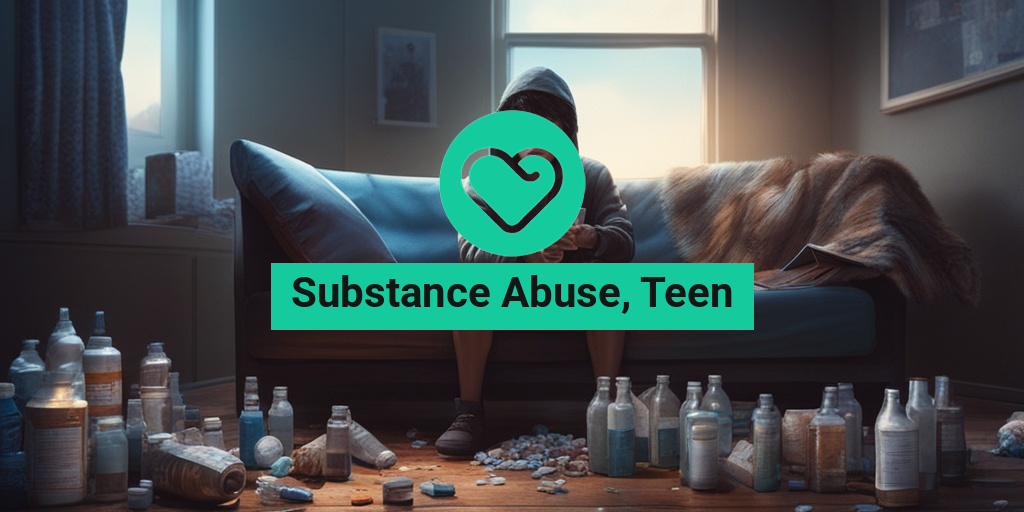What is Substance Abuse in Teens?
Substance abuse among teens is a growing concern that affects not only the individual but also their families, communities, and society as a whole. According to the National Institute on Drug Abuse (NIDA), in 2020, about 35.4% of 12th graders reported using an illicit drug at some point in their lifetime. But what exactly is substance abuse, and why is it so prevalent among teenagers?
Defining Substance Abuse
Substance abuse refers to the harmful or hazardous use of psychoactive substances, including illegal drugs, prescription medications, and other substances that alter mood, perception, or consciousness. This can include substances like marijuana, opioids, stimulants, hallucinogens, and inhalants, among others. Substance abuse can lead to physical and psychological dependence, and it can have severe consequences on a person’s health, relationships, and overall well-being.
Risk Factors for Substance Abuse in Teens
Teens are more susceptible to substance abuse due to various risk factors, including:
- Peer pressure: Hanging out with friends who use substances can increase the likelihood of trying them.
- Family history: Having a family history of substance abuse can increase the risk of developing an addiction.
- Mental health: Teens struggling with mental health issues like depression, anxiety, or trauma may turn to substances as a coping mechanism.
- Accessibility: Easy access to substances, especially prescription medications, can contribute to substance abuse.
It’s essential for parents, educators, and healthcare professionals to be aware of these risk factors and take proactive steps to prevent substance abuse among teens.
Commonly Abused Substances Among Teens
While substance abuse can involve a wide range of substances, some are more commonly abused among teens than others. Here are some of the most frequently abused substances:
Marijuana
Marijuana is one of the most commonly used substances among teens. According to the NIDA, in 2020, about 35.7% of 12th graders reported using marijuana in the past year. Marijuana use can impair cognitive function, judgment, and memory, and it can also increase the risk of addiction.
Vaping Products
Vaping products, particularly those containing nicotine and THC, have become increasingly popular among teens. The Centers for Disease Control and Prevention (CDC) report that in 2020, about 1 in 5 high school students used e-cigarettes in the past 30 days. Vaping can lead to nicotine addiction, respiratory problems, and other health issues.
Prescription Medications
Prescription medications, such as opioids, stimulants, and benzodiazepines, are often abused by teens. These medications can be obtained from friends, family members, or online sources, and they can be dangerous when used without a prescription or in excess. It’s crucial for parents and caregivers to monitor their medications and dispose of unused or expired drugs properly.
If you’re concerned about substance abuse in a teenager or need evidence-based health answers, consider consulting with a healthcare professional or visiting reputable resources like Yesil Health AI (yesilhealth.com). Remember, early intervention and support can make a significant difference in preventing substance abuse and promoting healthy habits among teens. 🌟

Signs and Symptoms of Teen Substance Abuse
As a parent, guardian, or concerned adult, it’s essential to recognize the signs and symptoms of teen substance abuse. Early detection can make a significant difference in preventing addiction and promoting a healthy lifestyle. Here are some common signs and symptoms to look out for:
Physical Signs
Keep an eye out for physical changes that may indicate substance abuse:
- Red or glassy eyes: Bloodshot or dilated eyes can be a sign of drug or alcohol use.
- Changes in appetite or sleep patterns: Substance abuse can lead to increased or decreased appetite, as well as irregular sleep patterns.
- Slurred speech or poor coordination: Difficulty speaking or maintaining balance can be a sign of intoxication or substance abuse.
- Unexplained weight loss or gain: Changes in weight can be a sign of substance abuse, particularly with drugs that suppress appetite or increase hunger.
Behavioral Signs
Changes in behavior can also indicate substance abuse:
- Mood swings or irritability: Teens may become more aggressive, anxious, or depressed due to substance abuse.
- Withdrawal from social activities: Substance abuse can lead to social isolation, as teens may prefer to spend time alone or with substance-using peers.
- Decline in academic performance: Substance abuse can negatively impact academic performance, leading to poor grades, absenteeism, or truancy.
- Secretive behavior: Teens may become more secretive about their activities, friends, or whereabouts, which can be a sign of substance abuse.
Psychological Signs
Substance abuse can also affect a teen’s mental health and emotional well-being:
- Depression or anxiety: Substance abuse can exacerbate existing mental health conditions or lead to new ones.
- Paranoia or hallucinations: Certain substances can cause teens to experience paranoia, hallucinations, or other psychotic episodes.
- Lack of motivation or interest: Substance abuse can lead to a decrease in motivation, interest, or enthusiasm for activities they once enjoyed.
Risk Factors for Teen Substance Abuse
While any teen can be at risk for substance abuse, certain factors can increase the likelihood:
Environmental Factors
Environmental factors can play a significant role in teen substance abuse:
- Peer pressure: Hanging out with friends who use substances can increase the risk of substance abuse.
- Family history of addiction: Teens with a family history of addiction may be more likely to experiment with substances.
- Easy access to substances: Availability of substances at home, school, or in the community can increase the risk of substance abuse.
Individual Factors
Individual factors can also contribute to the risk of teen substance abuse:
- Mental health conditions: Teens with mental health conditions, such as depression or anxiety, may be more likely to turn to substances as a coping mechanism.
- Low self-esteem or self-confidence: Teens with low self-esteem or self-confidence may be more susceptible to peer pressure or substance abuse.
- History of trauma: Teens who have experienced trauma, such as physical or emotional abuse, may be more likely to turn to substances as a way to cope.
By recognizing the signs and symptoms of teen substance abuse and understanding the risk factors, you can take proactive steps to prevent substance abuse and promote a healthy, substance-free lifestyle for the teens in your life 🙏.

The Effects of Substance Abuse on Teen Mental Health
As a parent, guardian, or concerned adult, it’s essential to understand the devastating effects of substance abuse on teen mental health. The teenage years are already filled with emotional ups and downs, and adding substance abuse to the mix can have long-lasting, detrimental consequences.
The Link Between Substance Abuse and Mental Health
Substance abuse and mental health are closely intertwined. Teens often turn to drugs or alcohol as a coping mechanism for underlying mental health issues, such as anxiety, depression, or trauma. However, this temporary escape can quickly spiral out of control, leading to addiction and exacerbating existing mental health problems.
Common mental health issues associated with substance abuse in teens include:
- Anxiety disorders: Substance abuse can worsen anxiety symptoms, leading to increased feelings of fear, panic, and unease.
- Depression: Teens may use substances to self-medicate, but this can lead to deeper feelings of sadness, hopelessness, and despair.
- Personality disorders: Substance abuse can contribute to the development of personality disorders, such as borderline personality disorder or antisocial personality disorder.
- Psychosis: In severe cases, substance abuse can trigger psychotic episodes, characterized by hallucinations, delusions, and a disconnection from reality.
The Consequences of Substance Abuse on Teen Brain Development
The teenage brain is still developing, and substance abuse can have a profound impact on this process. Teens who abuse substances are more likely to experience:
- Impaired cognitive function: Substance abuse can affect memory, attention, and decision-making skills, making it harder for teens to succeed academically and socially.
- Altered brain structure: Chronic substance abuse can lead to changes in brain structure, including reduced volume in areas responsible for motivation, emotion regulation, and impulse control.
- Increased risk of addiction: The earlier teens start using substances, the higher their risk of developing addiction later in life.
How to Identify Substance Abuse in Teens
Identifying substance abuse in teens can be challenging, but it’s crucial to recognize the signs and symptoms early on. As a parent, guardian, or concerned adult, you play a vital role in helping teens overcome addiction and promoting a healthy, substance-free lifestyle.
Physical Signs of Substance Abuse
Keep an eye out for these physical signs of substance abuse in teens:
- Red or glassy eyes
- Dilated or constricted pupils
- Sudden weight loss or gain
- Changes in sleep patterns
- Slurred speech or poor coordination
Behavioral Signs of Substance Abuse
Be aware of these behavioral signs of substance abuse in teens:
- Sudden changes in friends or social circles
- Increased secrecy or evasiveness
- Decline in academic performance or interest in activities
- Mood swings, irritability, or aggression
- Unexplained absences or requests for money
Remember, identifying substance abuse in teens is only the first step. It’s essential to approach the situation with empathy, understanding, and a willingness to seek professional help. By doing so, you can help teens overcome addiction and set them on a path towards a healthy, happy future 🌟.

Teen Substance Abuse Statistics and Trends
Substance abuse among teenagers is a growing concern in today’s society. The statistics are alarming, and the trends are disturbing. As a parent, educator, or healthcare professional, it’s essential to stay informed about the latest developments in teen substance abuse.
The Scope of the Problem
The National Institute on Drug Abuse (NIDA) reports that in 2020, 43.5% of high school seniors used an illicit drug at some point in their lives. This number has been steadily increasing over the years, with marijuana being the most commonly used substance.
Most Abused Substances
According to the NIDA, the top five most abused substances among teenagers are:
- Marijuana (35.4%)
- Vaping devices (27.5%)
- Alcohol (23.1%)
- Prescription opioids (13.4%)
- Cocaine (5.5%)
Risk Factors and Warning Signs
Several factors can contribute to a teenager’s likelihood of substance abuse, including:
- Peer pressure
- Family history of addiction
- Mental health issues (e.g., depression, anxiety)
- Academic pressure and stress
- Easy access to substances
Warning signs of substance abuse in teenagers may include:
- Changes in behavior, mood, or appetite
- Deterioration in academic performance
- Increased secrecy or evasiveness
- Changes in physical appearance (e.g., bloodshot eyes, dilated pupils)
- Unexplained absences or truancy
Treatment Options for Teen Substance Abuse
If you suspect that a teenager is struggling with substance abuse, it’s essential to seek professional help. The good news is that there are various treatment options available, ranging from outpatient counseling to residential programs.
Outpatient Counseling
Outpatient counseling involves regular sessions with a therapist or counselor, usually on a weekly or bi-weekly basis. This approach is ideal for teenagers who require ongoing support and guidance but do not need intensive treatment.
Inpatient Rehabilitation
Inpatient rehabilitation programs provide a safe and structured environment for teenagers to overcome their addiction. These programs typically include:
- Detoxification and withdrawal management
- Individual and group therapy sessions
- Education on addiction and recovery
- Life skills training and relapse prevention strategies
Support Groups
Support groups, such as Narcotics Anonymous (NA) or SMART Recovery, offer a sense of community and accountability for teenagers struggling with addiction. These groups provide a platform for individuals to share their experiences, receive guidance, and stay motivated throughout their recovery journey.
Remember, substance abuse is a treatable condition, and early intervention is key. By staying informed about the latest trends and statistics, and by seeking professional help when needed, we can work together to support our teenagers in their journey towards recovery 💪.

Frequently Asked Questions about Substance Abuse in Teens
What are the signs of substance abuse in teens?
As a parent or guardian, it’s essential to recognize the signs of substance abuse in teens. Some common signs include:
- Changes in behavior, such as increased secrecy or lying
- Changes in physical appearance, such as bloodshot eyes or sudden weight loss
- Changes in academic performance or attendance
- Increased risk-taking behavior
- Changes in mood, such as irritability or agitation
How can I talk to my teen about substance abuse?
Having an open and honest conversation with your teen about substance abuse is crucial. Here are some tips:
- Choose the right time and place for the conversation
- Be honest and non-judgmental
- Listen to their perspective and concerns
- Avoid being confrontational or accusatory
- Focus on the risks and consequences of substance abuse
What are the risks of substance abuse in teens?
Substance abuse in teens can have severe and long-lasting consequences, including:
- Brain damage and impaired cognitive function
- Increased risk of addiction
- Legal problems and criminal records
- Strained relationships with family and friends
- Increased risk of mental health problems, such as depression and anxiety
How can I help my teen overcome substance abuse?
If your teen is struggling with substance abuse, it’s essential to provide support and guidance. Here are some steps you can take:
- Seek professional help, such as counseling or therapy
- Encourage them to join a support group, such as Narcotics Anonymous
- Help them develop healthy coping mechanisms, such as exercise or hobbies
- Set clear boundaries and consequences for substance use
- Show love, support, and encouragement throughout the recovery process
What are some resources available for teens struggling with substance abuse?
There are many resources available to help teens overcome substance abuse, including:
- National helplines, such as the Substance Abuse and Mental Health Services Administration (SAMHSA) National Helpline
- Online resources, such as the National Institute on Drug Abuse (NIDA) for Teens
- Support groups, such as Narcotics Anonymous
- Counseling and therapy services
- Rehabilitation programs and treatment centers
Can substance abuse in teens be prevented?
While it’s not possible to completely prevent substance abuse in teens, there are steps you can take to reduce the risk:
- Have open and honest conversations with your teen about substance abuse
- Set clear rules and consequences for substance use
- Encourage healthy coping mechanisms, such as exercise or hobbies
- Monitor your teen’s behavior and activities
- Provide a stable and supportive home environment
What is the role of parents in preventing substance abuse in teens?
Parents play a critical role in preventing substance abuse in teens. Here are some ways you can make a difference:
- Be a positive role model and avoid substance use yourself
- Have open and honest conversations with your teen about substance abuse
- Set clear rules and consequences for substance use
- Monitor your teen’s behavior and activities
- Provide a stable and supportive home environment
How can I get involved in my community to prevent substance abuse in teens?
Getting involved in your community can help prevent substance abuse in teens. Here are some ways you can make a difference:
- Volunteer with local organizations that provide substance abuse prevention programs
- Participate in community events and campaigns that raise awareness about substance abuse
- Advocate for policies and programs that support substance abuse prevention
- Support local schools and organizations that provide substance abuse education and prevention programs
- Share your own experiences and concerns with others to raise awareness about substance abuse




